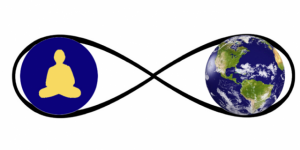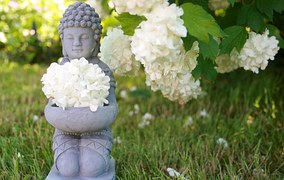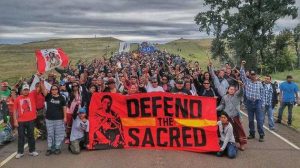Sunday
Featured StoriesAt the Crossroads
As Buddhists, should we avoid the aggression and confusion of politics, becoming islands of peace?
by Daniel Phillips
 At my family’s Thanksgiving dinner, some of us were sympathetic with white supremacist views, some were appalled, and some wanted to not make any waves. Some were Evangelical Christians who looked forward to the apocalypse, some were Catholics, and some were of Jewish heritage. Following our election and the rise of the alt-right, the personal can quickly become political.
At my family’s Thanksgiving dinner, some of us were sympathetic with white supremacist views, some were appalled, and some wanted to not make any waves. Some were Evangelical Christians who looked forward to the apocalypse, some were Catholics, and some were of Jewish heritage. Following our election and the rise of the alt-right, the personal can quickly become political.
Politics is most often considered to be a pejorative term. Still, according to Aristotle, “Man is a political animal. A man who lives alone is either a Beast or a God.” By giving up on our state, are we not also giving up on our society, even our humanity? Or, are we considering ourselves to be gods, above it all?
Recently, one of the members of the Atlanta Shambhala Center resigned her membership because she felt that we had become “too political.” We have been hosting conversations on race, human rights, economics and our environment for over a year. Recently, two of our members drove a carload of donations to the Standing Rock Camp of Water Protectors in North Dakota. Our center’s Facebook page frequently has postings of these social issues. This might not seem like the island of peace that some feel is appropriate for a Buddhist center.
Mostly, politics is considered to be an aggressive expression of power. That power is generally accompanied by the victimization of some people and the indifference of others. We may resign ourselves to the role of being helpless bystanders. However, being a Shambhala Warrior seems to require a greater responsibility. How can we find light in this darkness?
When we abdicate our personal power, we make it easier for those who are more aggressive to take power. Allowing our natural awareness to resolve into indifference, we are actually facilitating aggression. Aggression and ignorance seem to have a symbiotic relationship. Our training as meditators can enable us to rouse our courage and confidence to look at the places that scare us, both in our mind and in our society.
In a relative sense, we will not find peace in our lives by avoiding conflict. As long as we experience duality, we will experience conflict. When we separate ourselves, we may be enabling some karmic dualistic cycle. But conflict can be resolved when we can have faith in each person’s basic goodness, and in that which is mutually beneficial to all of us. This is the long, hard road, but for better or worse, we are in this together.
 So how can we work with conflict? We can use our Shambhala teachings and practices to connect us, rather than to isolate ourselves. We can use the skillful means of compassion and wisdom to strengthen and repair our personal relationships. In the end, our society and our government are a web of personal relationships. We are all involved, and we are all responsible. We can engage in the challenging activity of not looking away from that which may seem too painful, or may seem to be “not my problem.” We can take care, beginning with ourselves and extending that care to others, even to those we don’t know. We can improve our conversation skills, particularly those of truly listening.
So how can we work with conflict? We can use our Shambhala teachings and practices to connect us, rather than to isolate ourselves. We can use the skillful means of compassion and wisdom to strengthen and repair our personal relationships. In the end, our society and our government are a web of personal relationships. We are all involved, and we are all responsible. We can engage in the challenging activity of not looking away from that which may seem too painful, or may seem to be “not my problem.” We can take care, beginning with ourselves and extending that care to others, even to those we don’t know. We can improve our conversation skills, particularly those of truly listening.
“If you think that you are enlightened, go home for Thanksgiving,” goes an often-cited quote attributed to Ram Dass. That was especially true this year. Even if we live on death row or in a monastery, we can learn much from the company of others. For Aristotle, being with others included the noble endeavor of engaging in politics. He said, “Even if the end is the same for an individual and for a city-state, that of the city-state seems at any rate greater and more complete to attain and preserve. For although it is worthy to attain it for only an individual, it is nobler and more divine to do so for a nation or city-state.”
No doubt, we may be weary or discouraged by this year’s election cycle, and we may want to withdraw. But the Sakyong says that “only by staring directly at the confusion–examining it and absorbing its reality–will our species discover a way forward.” We seem to be at that crossroads.
Daniel Phillips serves as director at the Shambhala Meditation Center of Atlanta.






Dec 30, 2016
Reply
I invite you to revisit the teachings of the VCTR on Vajra Politics. This subject is not new in our sangha. I am a student in the sangha from the 1970s, so I share what I remember.
Dec 10, 2016
Reply
Vinaya came to mind.
“Economy” arises from “Greek oikonomia “household management””, right? (Evidently also the name of an essay by Aristotle. Who knew?!) So we take what’s close to home and go macro with it, generalizing as required.
Surely overtones of exploitation and rapaciousness aren’t definitional.
Similarly “politics” is rooted “science of government” or further back politika, “affairs of the cities”.
Can’t we take principles of relations with others and generalize those? I’m thinking of Kant’s “principles for perpetual peace”. “Don’t poison wells and salt the ground”, or “don’t beggar your neighbors”. (I picked up “Don’t be falsely nice” somewhere along the path. Likewise “Do not indulge the unjust”.)
Mangalam!
–KC:
Dec 9, 2016
Reply
Hi Daniel,
Appreciate your article as we navigate this particularly difficult time, where there is so much that challenges our notions of basic goodness and basic decency. I agree that arrogance and ignorance is a particularly toxic combination, and now it is combined with aggression and willful misinformation. Truly we need to rouse our dignity and confidence, as well as skillful means, as we try to move forward.
With much appreciation,
Nicki
Dec 5, 2016
Reply
Thank you for publishing this article. It is quite a topic for discussion these days. — The article inspired me to
explore this issue internally. Speaking for myself, I would have to examine my motives for action or non action. I would have to be honest with whether I was acting out of fear or compassion. I would also want to compare my intentions with the teachings, with consideration for how it relates to practice. A specific teaching about conflict that comes to mind is in Mindfulness in Action, Touching the Surface of the Mind.
I personally think that conflicts, whether they are from political conditions, family interactions, workplace conflicts, or even our personal interactions within the sangha are all basically the same. They are all opportunities for practice. How we experience the conflicts and how we relate to the conflicts are personal.
I recently participated in a class about Shunyata based on talks that Chogyam Trungpa gave at Tail of the Tiger in 1974. During a discussion after one of the classes, one of the participants addressed the current political trend, and completed his discussion with saying that perhaps Donald Trump is our gift to practice. I thought that was quite interesting. I actually felt appreciation instead of confusion.
Thank you.
Dec 4, 2016
Reply
Dharma and politics. That’s an interesting issue. But you seem to be actually talking about “conflict” and social discomfort. How do we bring that to practice? There’s often a misunderstanding among Buddhists in thinking that practice should bring peace. It might bring peace of mind. But that’s not peace. And how can there be either when one takes sides?
What’s the difference between conflict and politics? Isn’t there a difference between working with your aggression at the Thanksgiving table and taking political action through a Dharma center? The former is practice. Deciding how the world should be is not practice. Isn’t politics the same as business, or family, when it comes to practice? In all cases of worldly endeavor, practice involves letting go of self-interest and practicing mindfulness. Isn’t that why there’s an 8-fold path? It’s not because there are 8 parts to life but because we have a weakness for exempting some things from the field of practice as being special cases.
I recall that CTR, in a 1976 talk that used to be available on cassette tape, talked about how we don’t trust the nowness of experience, and…”Maybe that’s why we vote for the Presidents.” :)
Dec 4, 2016
Reply
Ki! K! So! So! Thank you Dan for your article. It is the delight of warrior to feel the quivering, sharp, aliveness of opening our hearts to the challenges of being human in this day and age! May we hold ourselves and each other in tenderness and love. May we be of benefit in this world.